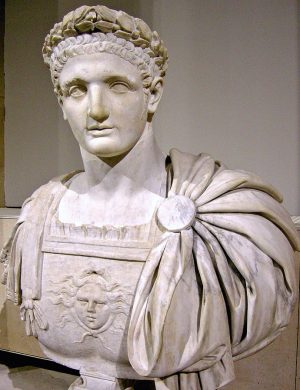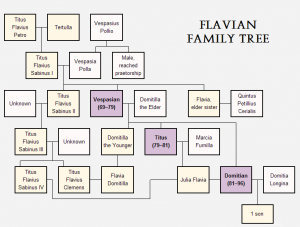| Domitian | |
|---|---|
 |
|
| Roman Emperor | |
| In Power | Sep 14, 81 – Sep 18, 96 |
| Born | Oct 24, 51 Rome, Italy |
| Died | Sep 18, 96 (aged 44) Rome, Italy |
| Wife | Domitia Longina (70–96) |
| Father | Vespasian |
| Mother | Domitilla |
Domitian was born Titus Flavius Domitianus, the second son of Vespasian. His father was the last emperor in the Year of the Four Emperors, who heralded a period of stability and the start of the Flavian dynasty. After the death of his older brother Titus, Domitian succeeded to the throne and became the longest-reigning Flavian. He had a reputation for being a tyrant, although many modern analysts attribute this to biased historical accounts. Domitian was known for his proactive leadership and paranoid behavior.
Family and Personal Life
Domitian was one of the emperors during the Flavian Dynasty. In the aftermath of the civil war during the Year of the Four Emperors, Rome’s old aristocracy gave rise to a new set of Italian families to take power. Gens Flavia or the Flavians were one of the Italian families that came into prominence, garnering status and wealth during the Julio-Claudian dynasty.
This rise can be traced back to Domitian’s great-grandfather, Titus Flavius Petro. Petro was one of Pomey’s centurions during Julius Caesar’s civil war. Although he ended his military servitude in dishonor due to retreating from the Battle of Pharsalus in 48 BC, he was able to marry a rich woman named Tertulla. Her fortune only ensured the wealth and prestige of their son Titus Flavius Sabinus I. Sabinus increased his fortune consistently due to his positions as an equestrian, a tax collector in Asia, and a banker in Helvetia. Sabinus eventually married Vespasia Polla from the esteemed gens Vespasia. This is what led to the upward mobility of his own sons Titus Flavius Sabinus II and Vespasian. Both gained senatorial ranks.
Titus Flavius Domitianus was born to Titus Flavius Vespasianus or Vespasian, the future emperor, and Flavia Domitilla Major on October 24, 51 CE on Pomegranate Street, which is in the 6th district of Rome. He was the youngest son of the two. His mother passed away in the early years of his life. Domitian had an older sister named Domitilla the Younger and an older brother who was also named Titus Flavius Vespasianus.
An account from the historian Suetonius chronicled Domitian’s experiences during Vespasian’s battle to overthrow Vitellius and the eastern provinces. Together with his uncle, Flavius Sabinus, Domitian was hiding in a temple in Rome. Vitellius’ supporters were able to burn the temple, and Sabinus died in the fighting that ensued.
Rise to Power
Domitian’s brother, who was called Titus, was groomed by their father, Vespasian, to succeed him. Many thought he was intelligent and capable. On the other hand, Domitian was not given what was considered to be the proper preparation for a future emperor despite being the next in line for the title of emperor after his brother. Domitian was overshadowed by his brother, who was given numerous responsibilities and guidance as the heir to Vespasian. Domitian had several ceremonious titles instead, which hindered him from receiving the appropriate training to rule. While he was consul six times, Titus was consul more than seven times when Vespasian was emperor.
When Vespasian was ordered to take charge of the Roman army against insurgents, Titus led with him, having finished his military studies. Titus was given a hefty role during what is now called the First Jewish–Roman War. Titus and Vespasian long commanded armies in Judaea and Germania, building the former’s military prestige. After his father’s death, his reign was held with positive regard by the citizens despite the tragedy of the eruption of Mount Vesuvius.
Titus’ rule was short-lived as he died of a sudden fever in 81, only two years into his reign. He did not have a son, leaving his brother to take over as emperor. Suetonius described Domitian as having cared more about his ascension to the throne than his brother’s worsening state of health. Although he honored Titus with deification after his death, he was known to attack Titus and his memory in edicts and speeches.
Married Life
Domitian married Domitia Longina, who was the youngest daughter of Gnaeus Domitius Corbulo. He was a distinguished general but gained even more fame in public circles as a political leader in Armenia. Additionally, Domitia had a direct link to Emperor Augustus, her grandmother being Junia Lepida, one of his descendants. Domitian went to great lengths to wed Domitia as Vespasian originally planned for him to marry Julia Flavia to pursue a dynastic connection. However, Domitian was stubborn and was able to convince Domitia’s husband, Lucius Aelius Lamia Plautius Aelianus, to divorce her. Domitian’s marriage to Domitia connected him to the senatorial opposition while also supporting Flavian propaganda.
In AD 80, Domitian and Domitia’s only son was born; however, he died in 83. Once Domitian was named Emperor, Domitia was given the title Augusta and their son deified. In 83, Domitian banished Domitia, although the exact reasons are not known. Rumors circulated around an affair with Julia Flavia or due to her inability to bear an heir. She was able to return shortly after. Despite this, their marriage was documented to have been happy as Domitia often came with Domitian to the amphitheater. Conversely, Domitia was suspected to be part of the conspirators who assassinated Domitian.
Reign
Domitian was emperor from 81–96, the longest of the Flavian dynasty. While his father and brother held up a republican facade during their reigns, Domitian veered away from these ideals and focused the government’s power towards the imperial court, leaving the Senate powerless. He was of the opinion that he should be the sole ruler of the Roman Empire in a divine monarchy naming himself “dominus et dus,” which meant “master and god.” He believed that his power extended to all facets of everyday life, commanding people in aspects such as morality and culture.
As an emperor, Domitian was ambitious, aiming to restore the abundance and stability experienced during the time of Emperor Augustus. To accomplish this, he established several economic, cultural, and military programs.
Domitian was passionate about the improvement of Rome and was proactive in each branch of administration. Taxation, laws, and morals were strictly imposed. Bureaucracy was implemented in an efficient manner as Domitian was known to be paranoid. Corruption was reduced among elected officials as well as provincial governors.
While Vespasian and Titus engaged in nepotism, this was not allowed in Domitian’s reign. Domitian recruited those who he evaluated to be flexible but loyal to important posts. These were personality traits more common among equestrians instead of his family members or the Senate, whom he undermined. If he had any suspicions about officials, they were removed from their posts immediately.
Domitian spent more time outside of the capital than any other emperor. Throughout his administration, he had a personal approach, traveling himself for military transactions. The imperial court was positioned in Alba or Circeii in the early years of his reign until the Flavian Palace was completed. The seat of power was no longer in Rome but the location that Domitian was at the time. At the end of his reign, Domitian traversed through the European provinces at length, staying in Illyricum and Germania.
Death
Domitian’s paranoid nature made everyone in his vicinity fearful for their lives. This resulted in numerous plots to murder him.
Suetonius discussed the conspiracy to kill Domitian as a group effort which allegedly included Domitia herself despite their happy marriage. The one who killed Domitian was a member of Domitian’s staff, Stephanus, who feared for his life due to an accusation of embezzlement. For a period of time, he walked around with a fake army injury for which he wore a bandage around his arm. In the wrapping, he hid a dagger and spoke with Parthenius, the emperor’s valet, about a group of conspirators against Domitian. In a private audience with Domitian, he took out his dagger and stabbed the emperor in the groin. Domitian’s ashes were later interred at the Temple of Flavian by Phyllus, his old nurse.
